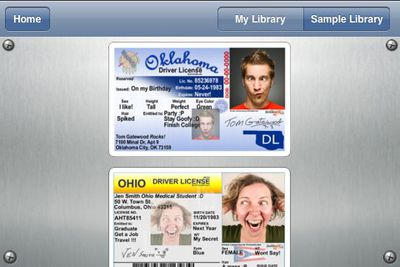Apple Pulls App for Creating Fake Driver's Licenses Following U.S. Senator's Complaint

The Coalition for a Secure Driver's License today announced that U.S. Senator Bob Casey of Pennsylvania has sent a letter to Apple requesting the removal of a free app that allows users to easily create digital fake IDs from the App Store.
The "License" application by DriversEd.com for Apple iPhone, iPod Touch, and iPad allows users to electronically insert any digital photo and the biographic information of their choosing into a template for a driver's license of a state of their choosing. The "License" application contains templates for driver's licenses for all 50 states, many of which are of designs that will be valid for the next several years. The user is then able to send the high quality digital image of the completed template to an email account. From the email attachment, the image can then be printed and laminated, creating a high quality counterfeit driver's license difficult to discern from one that's genuine.
Casey reportedly noted in his letter that the ease with which the app allows counterfeit licenses to be produced poses significant risks related to identity theft, underage alcohol and tobacco purchases, and national security.
In his letter, Senator Casey stated that, "I believe this application poses a threat to public safety and national security…it can be used in a way that allows criminals to create a new identity, steal someone else's identity, or permit underage youth to purchase alcohol or tobacco illegally. National security systems depend on the trustworthiness of driver's licenses, yet with a counterfeit license created by the app, a terrorist could bypass identity verification by the Transportation Security Administration, or even apply for a passport."
While the app had been available in the App Store for over two years, it appears that Apple has now quickly responded to Casey's letter by removing the app from the App Store. The Coalition for a Secure Driver's License had sent a letter to Apple's Scott Forstall back in April, requesting removal of the application. Apple apparently did not, however, respond to that initial request.
This is not the first time that elected government officials have gotten involved in disputes over App Store applications. Earlier this year, a group of four U.S. senators sent letters to Apple, Google, and Research in Motion requesting removal of several apps that alert users to the locations of sobriety testing checkpoints. Apple took its time responding to the issue, which is considered controversial as some law enforcement agencies support public notification of the locations of such checkpoints. Ultimately, Apple updated its review guidelines to prohibit the use of DUI checkpoint location information except in cases where the information has been made publicly available by law enforcement.
Popular Stories
The long wait for an Apple Watch Ultra 3 appears to be nearly over, and it is rumored to feature both satellite connectivity and 5G support.
Apple Watch Ultra's existing Night Mode
In his latest Power On newsletter, Bloomberg's Mark Gurman said that the Apple Watch Ultra 3 is on track to launch this year with "significant" new features, including satellite connectivity, which would let you...
The iPhone 17 Pro Max will feature the biggest ever battery in an iPhone, according to the Weibo leaker known as "Instant Digital."
In a new post, the leaker listed the battery capacities of the iPhone 11 Pro Max through to the iPhone 16 Pro Max, and added that the iPhone 17 Pro Max will feature a battery capacity of 5,000mAh:
iPhone 11 Pro Max: 3,969mAh
iPhone 12 Pro Max: 3,687mAh...
Apple's next-generation iPhone 17 Pro and iPhone 17 Pro Max are just over two months away, and there are plenty of rumors about the devices.
Below, we recap key changes rumored for the iPhone 17 Pro models.
Latest Rumors
These rumors surfaced in June and July:Apple logo repositioned: Apple's logo may have a lower position on the back of the iPhone 17 Pro models, compared to previous...
The upcoming iPhone 17 Pro and iPhone 17 Pro Max are rumored to have a slightly different MagSafe magnet layout compared to existing iPhone models, and a leaked photo has offered a closer look at the supposed new design.
The leaker Majin Bu today shared a photo of alleged MagSafe magnet arrays for third-party iPhone 17 Pro cases. On existing iPhone models with MagSafe, the magnets form a...
Apple's position as the dominant force in the global true wireless stereo (TWS) earbud market is expected to continue through 2025, according to Counterpoint Research.
The forecast outlines a 3% year-over-year increase in global TWS unit shipments for 2025, signaling a transition from rapid growth to a more mature phase for the category. While Apple is set to remain the leading brand by...
iOS 26 and iPadOS 26 add a smaller yet useful Wi-Fi feature to iPhones and iPads.
As spotted by Creative Strategies analyst Max Weinbach, sign-in details for captive Wi-Fi networks are now synced across iPhones and iPads running iOS 26 and iPadOS 26. For example, while Weinbach was staying at a Hilton hotel, his iPhone prompted him to fill in Wi-Fi details from his iPad that was already...
Apple today seeded the second betas of upcoming iOS 18.6 and iPadOS 18.6 updates to public beta testers, with the betas coming just a day after Apple provided the betas to developers. Apple has also released a second beta of macOS Sequoia 15.6.
Testers who have signed up for beta updates through Apple's beta site can download iOS 18.6 and iPadOS 18.6 from the Settings app on a compatible...




















